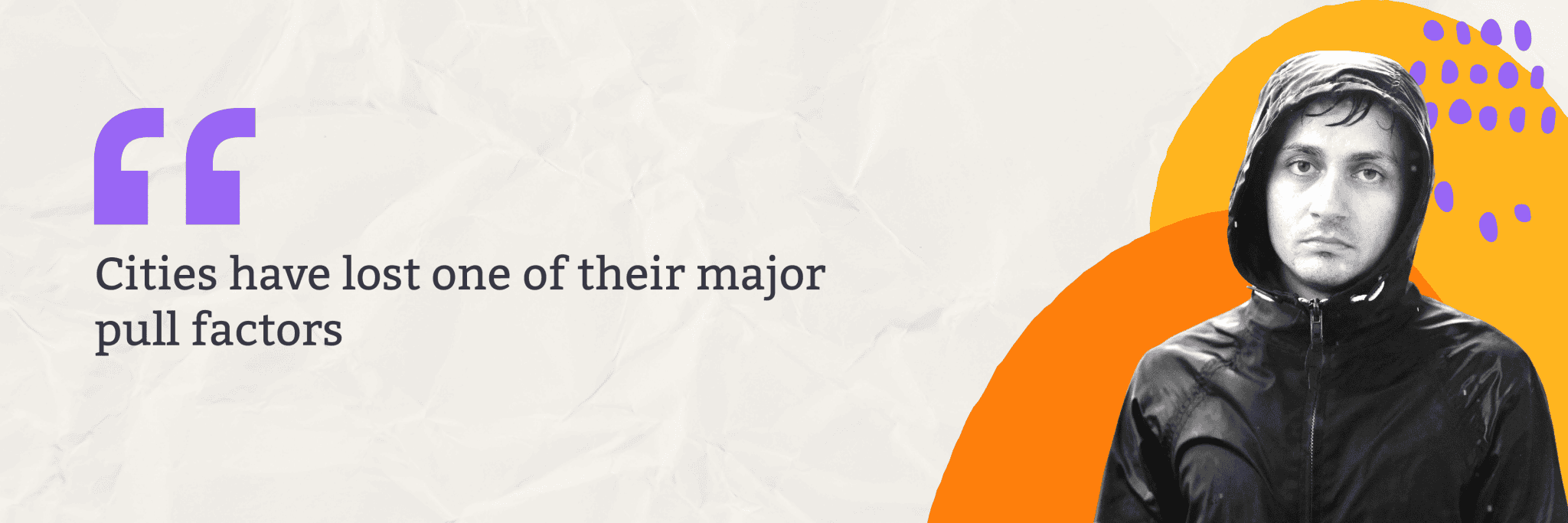The Future of Cities in a Remote Working World

Barry Nyhan
Senior Demand Gen & Marketing Ops
14 Jun 2022

Greater flexibility with where we work could impact the future of cities around the world for the better – as long as we prioritize individual preference.
The office is dead. Urbanism is over. Cities are in decline.
If you were paying attention to the news in late 2020 and early 2021, you probably came across headlines and social media posts with sweeping declarations that predicted the end of offices, and with it, urbanization. Such prophecies suggested that major urban hubs like New York and San Francisco would soon become hollowed-out ghost towns. In the near future, the theory went, we’d all be living on multiple acres of suburban or rural land connected to the outside world by a phone line and internet connection, swimming in pools of money saved on real estate like ‘Scrooge McDuck’.
Of course, these prophecies were completely false, but it’s not all that surprising that they gained viral status in those uncertain early days of our grand remote work experiment.
That is because the theory was based on sound reasoning, but taken to an unlikely extreme. Since the age of industrialization, those looking for work often needed to transition from rural to urban areas in order to find the economic opportunities that were lacking in their local communities. Once economic opportunities become decoupled from physical location, as they did with the sudden rise in remote work during the pandemic, it’s not all that far-fetched to suggest that cities have lost one of their major pull factors.

If factory workers at the turn of the century had the opportunity to work from home, then it stands to reason that ‘company towns’ may have never sprouted in places like Hershey, Pennsylvania or Detroit, Michigan. If bankers were able to work remotely in those days, then perhaps we would have never had financial districts in places like London and New York. But we’ve come a long way from economic opportunity being the only driver of urbanization, and cities these days offer residents a lot more than a higher salary.
Preferences should reign supreme
I’ve personally been working remotely for almost ten years, and though the lifestyle suits my needs well, I have never and would never suggest that it’s every office worker’s preference. I also lived in the downtown core of a major urban centre (Toronto) for that entire period, and at no point would I dare suggest that this is the ‘right’ or ‘only’ way to live.
To believe that the pandemic would be the end of cities is to believe that everyone who lives in a city would much rather live elsewhere. Similarly, to believe that remote work would kill the office is to assume that every office worker is happier working from home.
In reality, there remains a large proportion of the population that wants to continue living in a big city, just as there are countless employees who prefer working in an office. The big difference, however, is that many who don’t love working in an office or living in a major urban center no longer have to choose between their career and their desired lifestyle.
For many, these decisions were made out of career necessity, not personal preference. In theory, remote work should usher in a world where people have more choice, both in terms of where they work and where they live. To assume that everyone will make the same choice defeats the whole purpose of our newfound flexibility.

The future of cities
So, what does a world of greater work flexibility mean for the future of cities? My hope – and perhaps I’m being a little bit too optimistic – is that remote work will make cities better.
Whether you live in San Francisco or New York or London or even Toronto, it’s unlikely that the greatest problem your city faces, both today and before the pandemic, is not having enough residents. In fact, major cities tend to have significant challenges brought by rapid urbanization, ranging from traffic congestion, pollution, and homelessness to affordability, infrastructure, and resource scarcity. Picking on my hometown, Toronto’s population has exploded in the last couple of decades, and our transit system and other vital infrastructure can hardly keep up with its growth.
Remote work could provide an opportunity for that portion of the population that doesn’t want to live in the city to move elsewhere. And this may prove to be a mutually beneficial arrangement, as I suspect that most urbanites would invite a slowdown in population growth, especially among its least enthusiastic residents, in the hopes of improving congestion, housing affordability, and resource availability, among other things.
Remote work didn’t kill cities, as many had predicted at the start of the pandemic. But if we’re lucky, it just might make them a bit more liveable for those of us who prefer urban living.

